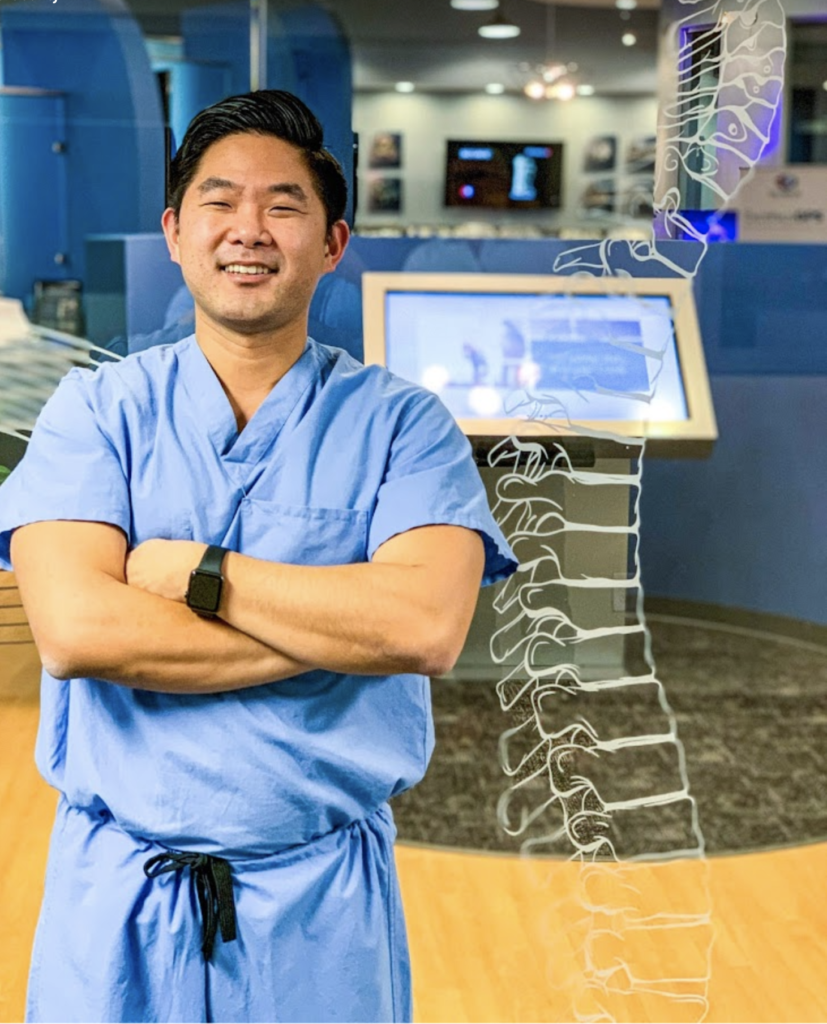
Dr. Daniel E. Choi is a Harvard-trained spine surgeon
If you’ve been told you need to undergo spine surgery, chances are you’re feeling a lot of different emotions. It’s exciting to look ahead to a life free from pain, but it can also be scary to think about the risks involved with surgery. After all, spinal surgery is incredibly complex, requiring the most precise touch from a highly trained surgeon to perform it safely and effectively. That’s why it’s important to find an orthopaedic spine surgeon who goes above and beyond to provide the very best care.
Of course, all orthopaedic spine surgeons have rigorous and extensive training to prepare them for the complexities of spine surgery (and since they’re usually referred to as “orthopedic” spine surgeons, we’ll use the common spelling from here on). But only a select few, like Dr. Daniel Choi, go the extra mile to achieve excellence in their field through a fellowship program. What does it mean to be a fellowship-trained orthopedic spine surgeon and what kind of training do spine surgeons have overall? In this post, Spine Surgery & Medicine of Long Island will share:
- What an orthopedic spine surgeon does
- The type of training fellowship spine surgeons have
- When to see a spine specialist
What is an Orthopedic Spine Surgeon?
Your musculoskeletal system is an inherent part of your everyday life, responsible for helping you move your body and engage in your daily activities. Composed of your bones, joints, ligaments, muscles, tendons and nerves, the musculoskeletal system can commonly become inflamed, overburdened or susceptible to disease. Orthopedic surgeons are dedicated to the diagnosis, treatment, rehabilitation and prevention of the diseases that affect the musculoskeletal system.
Though “surgeon” is in the name, orthopedic surgeons do not only perform surgery. Rather, they use a combination of non-surgical and surgical techniques to treat their patients, including medical management, physical therapy and surgical procedures. Since the field of orthopedics is so large, many surgeons choose to specialize in one specific area, such as the spine.
What Schooling Does My Orthopedic Spine Surgeon Have?
Every orthopedic surgeon must go through many years of intensive education and training before they can perform surgery. The requirements to become an orthopedic surgeon include a four-year college degree with a premedical focus, four years of medical school, plus five years of residency in hospital. For many doctors, their formal education ends there. But some doctors voluntarily choose to continue their education past their residency with a fellowship program that focuses on a specific area of study, such as the spine. In most cases, fellowship training takes one more year to complete.
In other words, all fellowship-trained spine surgeons are surgeons, but not all surgeons are fellowship-trained. A fellowship is a specialized program that builds upon the surgeon’s skills, improving their expertise and providing in-depth, hands-on experience in their chosen area of surgery. This advanced, immersive training goes far beyond standard surgical training, allowing the surgeon to provide an elevated expert level of care.
So what does this look like in practice? After finishing his undergraduate and honor’s medical degree at Northwestern University, Dr. Choi completed his orthopedic surgery residency at Rutgers University. He then went on to complete a combined neurosurgical and orthopedic spine surgery fellowship through the Beth Israel Deaconess Medical Center and Harvard Medical School. This means Dr. Choi has specialized expertise in minimally invasive spine surgery and can help patients of all ages achieve freedom from pain.
When to See a Spine Specialist
Back and neck pain can be a debilitating experience that gets in the way of living your life to the fullest. If you’ve been avoiding certain activities in fear of aggravating your spine pain, you might be asking yourself, “Do I need spine surgery?” Visiting a spine specialist in Nassau and Suffolk County can help you get the answers you need and determine if you’re a candidate for spine surgery.
In most cases, we rarely jump straight to surgery as the first line of treatment. Dr. Choi takes a conservative approach and reserves surgery as a last resort. Surgery is not a cure-all for every condition. In fact, many neck and back conditions, like a herniated disc, will benefit more from conservative techniques, such as physical therapy, rest, injections and medication.
Ready to find out how Dr. Choi can help you overcome your pain? Contact Spine Medicine & Surgery of Long Island to book a consultation with your Nassau and Suffolk County spine specialist today. With a fellowship-trained spine surgeon, you’ll have the peace of mind that your recovery is in the best hands.



